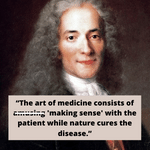Why I HATE discussions about treatment…….
My least favourite discussion to see online or god forbid to be involved in is about treatment. I get that treatment is important, but it really does seem to be the largest bone of contention amongst therapists. It’s a subject people certainly get very passionate about and dare I say it, even a little defensive. It is a huge area of uncertainty which lends itself to discussion, or even erm argument, and can often be a little frustrating & disappointing as it seems ‘nothing’ or ‘everything’ works given how the argument is spun.
But here is my issue…..
What I really wonder is why people get so passionate and even sometimes even form entire identities around what they treat the problem WITH rather than HOW they treat the person with the problem. The discussions never seem so passionate or prominent about all the other stuff that happens during an appointment. If you define yourself by your treatment and that does not ‘work’, which for a fair proportion of people that may be the case, now what?
For me this is entirely the point of the biopsychosocial model that is so often misapplied. The BPS was/is meant to be about the person with the problem rather than the problem itself.
I certainly don’t treat pain, I treat a person with pain and that’s about recognising the significant impact pain has on someone’s life and how THEY feel, their thoughts and feelings about all this stuff that is happening to them. It’s about HOW I go about the whole process of treating them, not just whatever intervention, treatment, modality or whatever we are using to treat their pain or another outcome measure.
This might be a really good reason to become a little more research literate too as with so many big opinions around the treatment evidence base it can be hard to get a balanced view of what actually works and more importantly HOW MUCH it works. It’s also important to remember that what happens clinically might be different to what happens at a population level with a controlled study. This is always the problem of integrating research into clinical practice. My clinical practice involves using evidence to guide me but also being able to change and adapt to the person too when necessary.
There are so many other things that are probably involved in outcomes and even more importantly the process that people go through with a healthcare encounter, regardless of outcomes. These might the assessment (history & physical), communication style, our explanations & reassurance, the support & guidance we give & behaviour change implementation. Treatment is only a small part of an appointment often (for me anyway) and actually all these other things are often involved in the treatment smorgasbord and can also have an impact on the outcome.
In fact, so many things outside of our control can affect the outcome I am not often sure how much of it is actually my treatment anyway. So much of what affects us is rooted in the systems and society we exist in and maybe we should worry more about what we can control such as the processes we go through with a person and how we go about working WITH them rather than simply an outcome from a specific treatment type. I am much more comfortable with that than a blind faith in whatever is being applied.
Some patients may need their health addressing, other’s hands on treatment, another basic reassurance and someone might need to restore confidence in their movement or even a combination of all of the above. Why would we expect everybody, given the complexity of pain & the heterogenous nature of people to require just one thing anyway?










Leave a Reply
Want to join the discussion?Feel free to contribute!